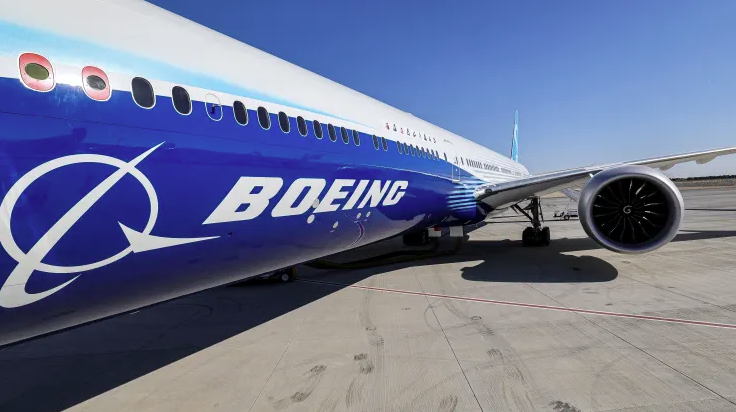Is Boeing's commitment to safety enough to prevent future disasters?
Deaths of whistleblowers John Barnett and Joshua Dean stir controversy
SHARIFAH SHAHIRAH
SHAH ALAM - Since 2020, the aviation industry has faced numerous distressing incidents involving Boeing aircraft, from catastrophic crashes to alarming malfunctions, undermining public confidence and raising questions about the manufacturer's safety protocols and oversight.
The series of incidents began on January 8, 2020, when Ukraine International Airlines Flight 752, a Boeing 737-800, was shot down by the Islamic Revolutionary Guard Corps shortly after takeoff from Tehran, killing all 176 on board.
The devastating incident resulted in the loss of 82 Iranians, 63 Canadians, 11 Ukrainians, 10 Swedes, 4 Afghans, 3 Britons, and 3 Germans, many of whom held dual nationalities.
Iran's final accident investigation report revealed that the missile defence system's last communication suggested a failed strike attempt, as the aircraft managed to evade radar detection.
The report included an account from an Iranian Aseman Airlines pilot who witnessed the missiles hitting PS752 during a separate flight.
This tragic event highlighted the potential for unforeseen catastrophic events, even as routine flight paths were being followed.
Further incidents have continued to erode trust in Boeing.
In March 2021, the crash of a Sriwijaya Air Boeing 737-500 into the Java Sea shortly after takeoff from Jakarta, Indonesia, tragically ended the lives of all 62 people onboard.
The incident was primarily attributed to a malfunctioning autothrottle system, compounded by pilot error.
The final investigation report identified the automatic engine throttle system, which had been reported faulty in the aircraft's maintenance logs 65 times since 2013, as a crucial factor in the crash.
The report detailed how the pilots failed to monitor effectively the asymmetrical thrust, with the left engine throttle significantly decreasing while the right engine's throttle remained high.
This discrepancy led to a loss of control and the aircraft entering an upset state.
The report also criticised the crew for their delayed response to the flight anomaly.
Factors such as pilot complacency, confirmation bias, and inadequate monitoring were significant contributors to the incident.
The investigation also pointed out that insufficient training on upset prevention and recovery exacerbated the situation, highlighting the need for enhanced training standards within Indonesian aviation.
Persistent technical issues in the 26-year-old aircraft's maintenance records highlighted unresolved mechanical problems.
In March 2022, a devastating crash involving a China Eastern Airlines Boeing 737-800 in Guangxi, China, claimed the lives of all 132 onboard. Flight MU5735 was travelling from Kunming to Guangzhou when it tragically descended into a hillside, marking China’s worst aviation disaster in nearly 30 years.
The Civil Aviation Administration of China’s ongoing investigation has yet to identify any anomalies in flight operations, with efforts continuing to determine the crash's causes through experimental verification and root cause analysis.
In a separate incident in January 2024, Alaska Airlines Flight 1282, a Boeing 737 MAX 9, experienced an explosive decompression mid-flight due to a door plug failure, which covered an optional emergency exit.
This malfunction led to a rapid cabin depressurisation, posing severe risks at high altitude.
Fortunately, the skilled pilots managed to initiate emergency procedures promptly and safely returned the plane to Portland.
Although there were no fatalities, the incident resulted in minor injuries for some passengers and significant concerns about Boeing's manufacturing standards and safety protocols.
The event triggered a comprehensive investigation and a temporary global grounding of Boeing 737 MAX aircraft to ensure passenger safety.
The series of crashes involving Boeing aircraft has not only resulted in numerous fatalities but also has deeply eroded public trust in the aerospace giant.
Adding to the concerns are the suspicious deaths of whistleblowers John Barnett and Joshua Dean, which have cast further doubts on Boeing's commitment to safety and transparency.
Barnett, a former Boeing quality manager and whistleblower, was discovered deceased in a hotel room in Bluffton, South Carolina, in March 2024.
Barnett, who had been involved in a whistleblower lawsuit against Boeing, accused the company of prioritising profits over safety.
The Beaufort County Coroner's Office ruled his death a suicide by hanging.
Having served over three decades at Boeing, Barnett was vocal about the company's compromised production standards and the dangers of cost-cutting measures on aircraft safety.
His death occurred shortly after providing a deposition in the whistleblower case, intensifying the seriousness of his claims and the overall concerns regarding Boeing's practices.
Dean, a former quality auditor at Spirit AeroSystems—a key Boeing supplier—died in May 2024 following a sudden illness.
Dean had slammed the supplier for overlooking defects in the production of the 737 MAX and claimed he was terminated in retaliation for exposing lax manufacturing standards.
The details surrounding his death remain undisclosed.
The mysterious circumstances of the deaths of Barnett and Dean, who both raised alarms about safety lapses at Boeing, have spurred speculation and unease within the public and aviation sectors.
These incidents raise questions about potential pressures or retaliation they might have faced due to their whistleblowing activities.
As aviation authorities, regulatory bodies, and the public scrutinise these developments, it is crucial for Boeing to commit to stringent safety measures and uphold transparency.
Restoring trust and ensuring the integrity of air travel worldwide depend on Boeing's ability to prioritise these aspects genuinely.












